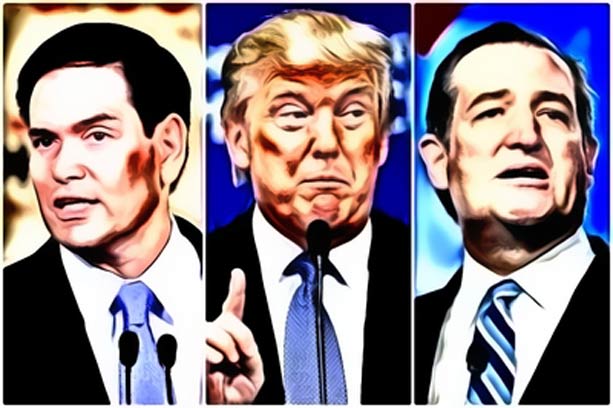
It has long been tempting to look at the rise of Donald Trump as a textbook case of what economists call a "collective action problem." It's what happens when a group of people fail to work together, for selfish individual reasons, and end up with an outcome nobody likes very much. Trump winning the Republican nomination for president this year would potentially be the greatest example of that economic principle in American political history, so much that we might need to rename it the "Trump problem."
You can make a case that Republicans are headed for that Trump Problem scenario. He leads in the polls, he leads in delegates won, he continues to dominate the network news airwaves. More than a majority of GOP voters still want someone else to be their nominee, but they're divided on whom they'd prefer. That gives the other candidates a selfish reason not to rally behind a single opponent to Trump.
Ted Cruz is running second in polling averages, with Marco Rubio close behind. Each appears to believe he could defeat Trump one-on-one for the nomination. This week cries have grown loud from conservative quarters for the field to thin itself, fast, before Trump racks up a critical mass of convention delegates.
"Being a Christian candidate for president means far more than advocating for life, religious liberty, and the family," National Review's David French wrote this week, in calling for lagging candidates Ben Carson and John Kasich to quit the race. "It means being humble and self-aware enough to know when your own vanity is hurting the country."
Those pleas could soon extend to Cruz or Rubio, if one of them moves into a commanding second place in the race. They all assume that each of the non-Trump candidates would prefer that anyone else other than Trump win the nomination. But what if that's not the case? What if some, or at least one, of the remaining challengers believes it would be in his interest for Trump to win the nomination, if that challenger can't win the nomination himself?
You wouldn't have a collective-action problem, then - and you'd have a much better chance of a Trump nomination.
Let's stipulate that we don't know the exact preferences of any of the candidates left running, and that we might not even from explicit public statements (Cruz, for example, was publicly chummy with Trump early in the race, but has attacked him of late). So all of this is pure strategy speculation.
You can make a case that Cruz should prefer the GOP nominate Trump instead of Rubio, or that Rubio should prefer Trump over Cruz. Cruz and Rubio are both young and both want to be president. Assuming they don't run on the same ticket, the chances would appear low that both men will reach the White House someday. If Cruz wins the nomination and the general election, Rubio has to wait eight more years for another shot, and he probably starts that election an underdog to Cruz's vice president. The same is true in reverse.
A Trump win very possibly shortens that wait. General election polls are notoriously unreliable at this stage in the election, but they suggest he is more likely to lose in November than Rubio or Cruz would be, creating another open primary in 2020. Even if Trump beats the Democratic nominee, he could prove ripe for a primary challenge in four years if he, say, pushed a single-payer health care plan through Congress.
In those scenarios, either Cruz or Rubio would prefer to be the second-place finished in a three-man race that ends with Trump being nominated. It would position the runner-up well for the next contested primary, whenever that might be. It would blunt the incentives for either man to drop out.
Consider a card game you may have played with your grandparents, Hearts. The object of the game is to collect as few cards with hearts on them as possible, because each heart is worth a point, and low score wins the game. Occasionally, though, one player will attempt what is called "shooting the moon" - collecting all the hearts in one round of play, plus the dreaded Queen of Spades. If he succeeds, he sticks each of his opponents with a huge amount of points. The way to stop him is by claiming one or more hearts, raising your score but reducing the damage to everyone.
Right now, Trump is trying to shoot the moon. If his opponents cared about stopping him, they'd all be looking to claim a heart - ready to suffer a personal loss for the good of the group. In cards, that strategy almost always succeeds for the group. A University of Alberta computer scientist ran a shooting-the-moon simulation several years ago and found that a reasonably knowledgeable player was able to stop a moon-shooter 9 out of 10 times.
When the moon shooter's opponents did not actively try to stop him, though, he succeeded more than 40 percent of the time.
This is an important point for conservatives fearing a Trump nomination. They need to sell Rubio and Cruz on the idea that a Trump win hurts their own long-term political interests, and so they should do whatever it takes to stop him.
That sale has already begun. "Many a self-interested actor hopes they'll rebuild the GOP around themselves amid the ashes" of a Trump victory, Noah Rothman wrote this week for Commentary Magazine. "That's nonsense. There will be no party to rebuild."
Previously:
• 02/16/16: The economist who vouched for Bernie Sanders' big liberal plans is voting for Hillary
• 10/23/15: Paul Ryan isn't a hypocrite on family time
Comment by clicking here.
Tankersley covers economic policy for The Washington Post. He's from Oregon, and he misses it.


 Contact The Editor
Contact The Editor
 Articles By This Author
Articles By This Author
